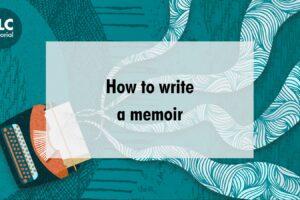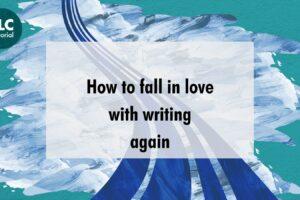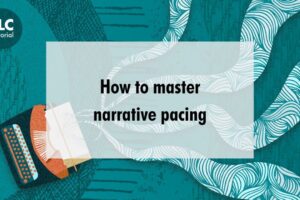It can take us weeks, months or years to birth a new piece of writing; work that means the world to us and which we hope one day might mean the world to others too.
We move from idea to realisation, following inspirations and urges along the way until we have what looks like a novel or a story, a poem or a script. Chiselling away at plots and storylines until they have the ring of truth to them; polishing words and lines until they have the gleam of silver – lighting up on the page like trout under moonlight.

We do all this and then we gather ourselves, take a deep breath and send what we’ve made out into the world – to agents, editors, publishers – hoping one of them will take the irresistible bait that we hope our work might prove to be.
But no. They pass, they decline, they turn us down. We are given reasons, or sometimes no reasons at all, and so we try elsewhere; hoping this is just a blip and that all it will take is a bit of persistence before our work lands on the right desk. But instead, the rejections keep coming and coming, in waves of greyness, until they dent our confidence and gnaw away at our self-belief. Am I any good? we might ask ourselves. Am I wasting my time? How is it I’ve been told I write well and yet nobody wants to publish me?
This is rejection, of course. Something all writers have experienced at some point, either when starting out or even now, when they might be considered established or even successful. It is a black pin in the heart when it happens. It deflates and demoralises us. It makes us question whether we should bother continuing, especially in the face of such adversity.
If you have experienced rejection, and chances are you have, then you’re not alone. Every writer has their own story of being turned down, be it someone still looking to have their first publication or a prize winner (Ben Okri’s and Paul Beatty’s novels were rejected 100 times and 18 times, respectively before going on to win The Man Booker Prize). My own debut novel was picked up by a stellar agent but then rejected by every publisher she sent it to. And there were any number of rejections for stories before then, and since – as well as declined applications for residences or funding. Rejection is everywhere you look – it goes with the territory of being a writer. So why are we so often embarrassed and ashamed by it? Why do we tend not to talk about it in the same openness we might talk about our successes? Might there be a way for us to see rejection in a more positive light instead of it being the elephant in our writing room?
I think there is. In a series of interviews I carried out following the rejection of my novel, I aimed to try and find a better way of looking at the subject and asked some of the best contemporary writers for their own thoughts. Their responses helped me to make peace with it – I hope they can help you too.

For Jenn Ashworth, whose first novel A Kind of Intimacy was rejected numerous times over the course of a year, it is part of the writing life – which, although painful, we should try to accept: ‘I see [rejection] as an entirely inevitable part of my job. It means I am doing what I am supposed to be doing, which is creating new work and sending it out to editors.’ She also suggests there can be any number of reasons why a piece is rejected: ‘Sometimes it means the work isn’t good enough, that it needs more time in the drawer, another few drafts, or abandoning altogether… sometimes it’s because of something that is nothing to do with your writing, but is to do with the system of publishing we have today.’ If this latter reason is the case, then she suggests that if there are gatekeepers who are reluctant to let you in, ‘then it’s your job to stop knocking at the door and blow a hole in the wall’.
Man Booker Prize shortlistee Alison Moore says we ‘can feel [rejection] as physical pain, as a kind of heartache, but you just have to learn what you can from it and press on’. She adds that ‘it’s not possible for a writer not to face rejection at some point’ and that the alternative scenario – where every piece is accepted, every competition won, every reader loving everything someone has written – is ‘far worse… than the ups and downs of the way life is’. A kind of Stepford Wives scenario which makes you shudder just to think of it. She adds that, instead, rejection can be a good and welcome thing: ‘I was once on a particular shortlist but didn’t get any further, and now I’m quite glad as winning would have meant publication of stories that I now don’t think were quite ready’.
Stephen Gallagher’s third novel Oktober was rejected by his publisher as well as many others before it eventually sold and became an ITV miniseries. He says he took ‘rejection personally just like everyone else’ but found that learning to shrug it off, ‘like a beating from a wooden sword in gladiator school’ was a valuable lesson.
Booker Prize winner Bernardine Evaristo’s first poetry manuscript was turned down by all the publishers she sent it to in the early 1990s. For her, it was a setback but it ‘never made [her] want to give up’. Instead, she says that setbacks can be positive in that they help us ‘develop our inner strength and resilience, which we all need eventually’. She says she doesn’t allow self-pity or self-doubt, and instead of asking ‘Why me?’ finds herself asking ‘Why not me?’, so that when she does receive any form of recognition or success, she will say: ‘About time – what took you so long?’. An attitude that many of us can learn from and try to adopt.
As these writers show, then, perhaps we should learn to embrace – and even love – our rejections rather than seeing them as something to be ashamed of. They prove we are writers for a start, writers who are trying to get our work out there in some way. As Sylvia Plath said, ‘I love my rejection slips. They show me I try.’ And so, we should keep going, keep writing, keep believing in what we do. All the while encouraging that little flicker of hope in our hearts to blossom and bloom until it burns strong and bright.
Writers on dealing with rejection:
- A. L. Kennedy: ‘It’s best not to take them personally – a lot of writing is about learning to control emotions that are unhelpful so that you can function. It’s a tough world.’
- Alison Moore: ‘Have more than one story out at a time, so as not to fixate on the fate of just one piece of work.’
- Bernardine Evaristo: ‘Don’t be crushed by other people’s gatekeeping. That said, take a good look at your work and make sure it is publishable and is going to stand out.’
- Jenn Ashworth: ‘I tell [people] to shrug and to carry on. To take a break if needed, but to get on with it. I tell them the hardest thing they will ever have to do in their writing careers is to figure out if rejection means there’s a problem with the writing, or a problem with the publishing world they can help change.’
- And one final uplifting quote from J. K. Rowling on Twitter: ‘You never know what the future holds. Astonishing reversals of fortune happen every minute.’ Amen.










3 responses
What a tonic and a balm this blog is.
The elephant is a friendly, welcome creature. It has brought a halt to self-talk to read it and now i can returning to work, and the inner chat, with a message from the outside world.
Thank you
Love this ❣️
This article is great to witness as someone who has a podcast focused on celebrating rejections and seeing that they actually can contribute to our personal and professional growth. Thank you for this article!